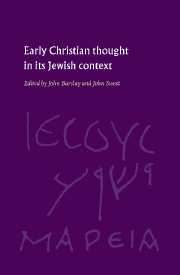Book contents
- Frontmatter
- Contents
- List of contributors
- Preface
- List of works by Morna D. Hooker
- List of abbreviations
- Chapter 1 Introductory Essay
- I THE SOCIAL CONTEXT OF EARLY CHRISTIANITY
- II SOME EARLY CHRISTIAN SOURCES
- Chapter 4 Jesus
- Chapter 5 Matthew
- Chapter 6 Mark
- Chapter 7 Luke–Acts
- Chapter 8 John
- Chapter 9 Paul
- Chapter 10 Deutero-Pauline letters
- Chapter 11 Hebrews
- Chapter 12 Revelation
- Chapter 13 Other early Christian writings: ‘Didache’, Ignatius, ‘Barnabas’, Justin Martyr
- III SOME EARLY CHRISTIAN THEMES
- Index of names
- Index of subjects
- Index of texts
Chapter 10 - Deutero-Pauline letters
from II - SOME EARLY CHRISTIAN SOURCES
Published online by Cambridge University Press: 22 September 2009
- Frontmatter
- Contents
- List of contributors
- Preface
- List of works by Morna D. Hooker
- List of abbreviations
- Chapter 1 Introductory Essay
- I THE SOCIAL CONTEXT OF EARLY CHRISTIANITY
- II SOME EARLY CHRISTIAN SOURCES
- Chapter 4 Jesus
- Chapter 5 Matthew
- Chapter 6 Mark
- Chapter 7 Luke–Acts
- Chapter 8 John
- Chapter 9 Paul
- Chapter 10 Deutero-Pauline letters
- Chapter 11 Hebrews
- Chapter 12 Revelation
- Chapter 13 Other early Christian writings: ‘Didache’, Ignatius, ‘Barnabas’, Justin Martyr
- III SOME EARLY CHRISTIAN THEMES
- Index of names
- Index of subjects
- Index of texts
Summary
INTRODUCTION
Given that Paul's thought was shaped in substantial degree by its Jewish context, to what extent is the same true of the Deutero-Pauline letters? Is a continuity visible between Paul and the Deutero-Paulines in their interaction with distinctively Jewish contexts? How do the Deutero-Paulines stand, for example, in relation to what I have elsewhere called ‘the four pillars of Judaism’ (monotheism, election, torah, temple) (Dunn 1991, ch. 2). Do they show similar dependence on Jewish categories and principles? Are they themselves properly to be described as ‘Jewish’? Alternatively expressed, is the dialogue with Paul's Jewish heritage as lively in the Deutero-Paulines as most explicitly in Galatians and Romans and more implicitly in other undisputed Paulines?
I have already offered a partial answer by noting the surprising lack of anti-Jewish features in these letters (Dunn 1993, pp. 151–65) – nothing parallel, for example, to 1 Thess. 2.14–16, Gal. 5.12, Rom. 5.20 or Phil. 3.2. But what of more positive influences? Or is it rather the case that the Deutero-Paulines bear testimony to the influence of Jewish context waning, to an interaction which now belongs to the past, with new and different agendas demanding attention? Of course, we must not assume a common authorship of the Deutero- Paulines or a consistency of Jewish influence (positive or negative) among them. At the same time, if that influence varies it may provide some further indication of changing circumstances and contexts.
- Type
- Chapter
- Information
- Early Christian Thought in its Jewish Context , pp. 130 - 144Publisher: Cambridge University PressPrint publication year: 1996
- 2
- Cited by



